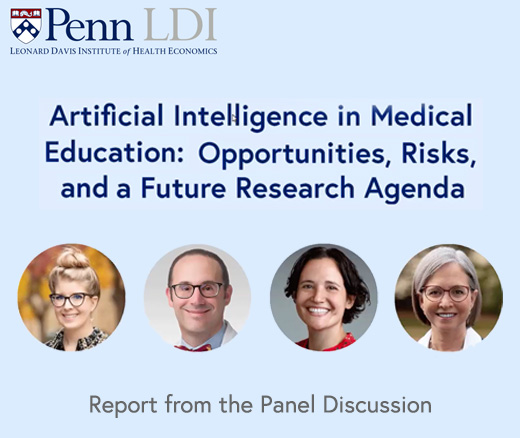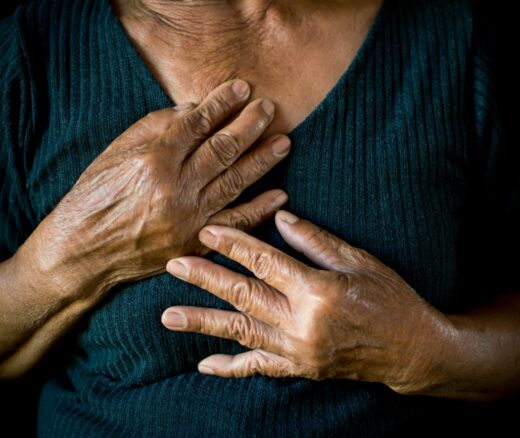
New National Study Finds Doctors Paid Less for Treating Black and Hispanic Patients
Physicians Were Paid About 10% Less for Visits Involving Black and Hispanic Patients, With Pediatric Gaps Reaching 15%, According to a First-of-Its-Kind LDI Analysis
Health Equity | Improving Care for Older Adults
News

The University of Pennsylvania’s Center for Improving Care Delivery for the Aging (CICADA) has announced three new postdoctoral and junior faculty who are the program’s seventh cohort of CICADA Scholars pursuing pilot research and receiving training and mentorship in health services research (HSR).
Established on the Penn campus within the Leonard Davis Institute of Health Economics (LDI) seven years ago, CICADA was initially funded by a five-year grant from the National Institute on Aging (NIA) as a Resource Center for Minority Aging Research (RCMAR). That grant was then renewed for another five years. The RCMAR program is a multidisciplinary research initiative aimed at improving the diversity of the HSR workforce studying aging and health care issues.
The three new grantees for the 2024-2025 CICADA cohort are:
Kimberly T. Arnold, PhD, MPH, Assistant Professor of Family Medicine and Community Health at the Perelman School of Medicine. Her CICADA pilot project is “Developing Strategies to Implement Mental Health Programming for Older Black Adults in Black Churches.”
Christin Iroegbu, PhD, RN, Postdoctoral Fellow at the Penn School of Nursing’s Center for Health Outcomes and Policy Research (CHOPR). Her CICADA pilot project is “The Influence of Nursing Resources on Mortality Disparities among Hospitalized Black and White Older Adult Kidney Transplant Recipients.”
Ernesto Ulloa-Pérez, PhD, Postdoctoral Researcher in Biostatistics, Epidemiology, and Informatics at the Perelman School of Medicine. His CICADA pilot project is “Evaluating Medicare’s Payment Programs by Enhancing Staggered Adoption Statistical Methods.”
Launched in 1997 with centers at a handful of universities, the NIA’s national RCMAR program has 18 research and training facilities across the country. Each center focuses on a different aspect of aging and health care. Penn’s program is one of a few that focuses on the discipline of health services research and the study of how health care delivery is organized, financed, managed, quality-controlled, and regulated.
The essential goal of RCMAR is to recruit, mentor, and develop junior faculty members into accomplished research scientists, a process that begins with pilot research projects they undertake with their mentors. Since its founding 27 years ago, more than 400 research scholars have come through the RCMAR program, most going on to academic research careers.
The broad RCMAR programs are informed by the fact that underrepresented researchers bring essential diverse perspectives and, often, personal experiences to bear in understanding the social, economic, political, and environmental determinants of racial and ethnic disparities in health and health care. According to the federal Office of Minority Health, underrepresentation in research leads to underfunding of health research as well as a lack of culturally appropriate theories, models, and methodologies.
The CICADA program is facilitated through Penn LDI and links to all of Penn’s 12 schools. CICADA mentors are drawn from across the University, creating an interdisciplinary approach to training.

Physicians Were Paid About 10% Less for Visits Involving Black and Hispanic Patients, With Pediatric Gaps Reaching 15%, According to a First-of-Its-Kind LDI Analysis

A New Review Finds Hospital Mergers Raise Prices Without Improving Care, and Urges Regulators to Stop Accepting Quality Claims to Justify Consolidations

CMS’s Main Risk Adjustment Method Underestimates Rural Patients’ Health Risks, LDI Fellows Show, Potentially Reducing Access to Care in the Heartland

Experts at Penn LDI Panel Call for Rapid Training of Students and Faculty

A Proven, Low-Risk Treatment Is Backed by Major Studies and Patient Demand, Yet Medicare and Insurers Still Make It Hard To Use

New Study From LDI and MD Anderson Finds That Black and Low-Income, Dually Eligible Medicare Patients Are Among the Most Neglected in Cancer Care